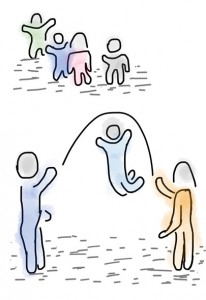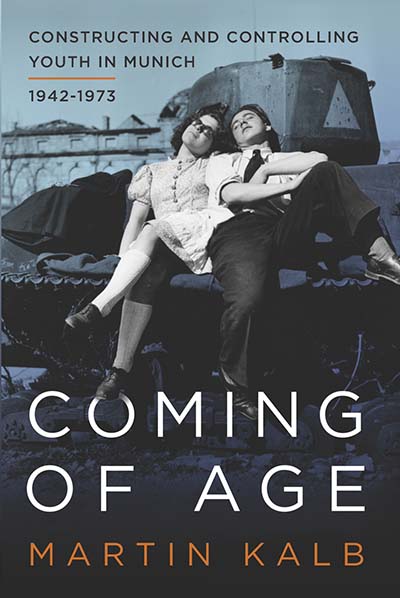
In celebration of Pride Month in June, enjoy free access to the following articles and chapters from Berghahn.


In celebration of Pride Month in June, enjoy free access to the following articles and chapters from Berghahn.

To commemorate Margaret Mead’s birthday this month, we’re honored to share a short piece from her daughter, Mary Catherine Bateson. Bateson is an anthropologist and the author of many books, including Composing a Life. As she notes below, 2015 marks the 91st anniversary of Mead’s trip to Samoa in 1925, when Mead did her fieldwork resulting in the seminal book Coming of Age in Samoa. Working closely with Mary Catherine Bateson and also Professor William O. Beeman, Berghahn Books republished six volumes of Mead’s writing, with new introductions, in the early 2000’s.
We’re pleased to announce new discounted prices on all titles in the Margaret Mead: The Study of Contemporary Western Culture book series, and we’re offering FREE access to this chapter titled Talks with Social Scientists: Margaret Mead on What is a Culture? What is a Civilization? from Studying Contemporary Western Society for a limited time.

Emma Pearce, Kathryn Paik and Omar Robles
Making It Up: Intergenerational Activism and the Ethics of Empowering Girls
Emily Bent
The Ethics of Representing Girls in Digital Policy Spaces
Emily Anderson
Suzanne Dunn, Julie S. Lalonde and Jane Bailey
A Brief History of Childhood in Boir Ahmad, Iran
Erika Friedl
Conflicts in Children’s Everyday Lives: Fresh Perspectives on Protracted Crisis in Lebanon
Erik van Ommering
“I Love You, Guys”: A Study of Inclusive Masculinities among High School Cross-Country Runners
Luis Morales and Edward Caffyn-Parsons
The Biologically Vulnerable Boy: Framing Sex Differences in Childhood Infectious Disease Mortality
Heather T. Battles
Victoria Cann and Erica Horton
Natasha Anand
by Martin Kalb
 I did not anticipate that I would focus on images or constructs of youth in Munich. My research was originally tied to denazification in Nuremberg, later Bavaria more broadly. That interest took shape as I was working in the Stadtarchiv City Archive in Nuremberg for several months, and while I was helping organize a database tied to individuals with connections to National Socialism. I dug deeper, looked into the main study on denazification in Bavaria at the time, and wondered how Nuremberg might fit into all that. Later on, once I began my Ph.D. program in the United States, I continued to look into the scholarship, maybe with a fresh mind given a broader change in scenery. In this context I was reading through Die Süddeutsche Zeitung newspaper on microfilm in the library one evening. At the time, it was among the few daily newspapers I could access for Bavaria. One headline struck me: “Bavarian Problems: Youth-Food-Export.” I wondered, how could the state of the young be as important as economic recovery? What was the obsession tied to youth about?
I did not anticipate that I would focus on images or constructs of youth in Munich. My research was originally tied to denazification in Nuremberg, later Bavaria more broadly. That interest took shape as I was working in the Stadtarchiv City Archive in Nuremberg for several months, and while I was helping organize a database tied to individuals with connections to National Socialism. I dug deeper, looked into the main study on denazification in Bavaria at the time, and wondered how Nuremberg might fit into all that. Later on, once I began my Ph.D. program in the United States, I continued to look into the scholarship, maybe with a fresh mind given a broader change in scenery. In this context I was reading through Die Süddeutsche Zeitung newspaper on microfilm in the library one evening. At the time, it was among the few daily newspapers I could access for Bavaria. One headline struck me: “Bavarian Problems: Youth-Food-Export.” I wondered, how could the state of the young be as important as economic recovery? What was the obsession tied to youth about?
Continue reading “The Rowdy Boy & the Deviant Girl: Constructing Youth in Munich, 1942-1973”
 Berghahn Journals is delighted to announce that we will begin publishing three new journals in 2015!
Berghahn Journals is delighted to announce that we will begin publishing three new journals in 2015!
These new publications will cover a range of topics across disciplines and promote academic discussion through articles, reviews, interviews, special sections, and more. For more information, please see below or click through to access the journals’ respective websites.
Boyhood Studies – An Interdisciplinary Journal
Boyhood Studies: An Interdisciplinary Journal is a peer-reviewed journal providing a forum for the discussion of boyhood, young masculinities, and boys’ lives by exploring the full scale of intricacies, challenges, and legacies that inform male and masculine developments. Boyhood Studies is committed to a critical and international scope and solicits both articles and special issue proposals from a variety of research fields including, but not limited to, the social and psychological sciences, historical and cultural studies, philosophy, and social, legal, and health studies.
One of the core missions of the journal is to initiate conversation among disciplines, research angles, and intellectual viewpoints. Both theoretical and empirical contributions fit the journal’s scope with critical literature reviews and review essays also welcomed. Possible topics include boyish and tomboyish genders; boys and schooling; boys and (post)feminisms; the folklore, mythology, and poetics of “male development”; son-parent and male student-teacher relations; young masculinities in the digital and postdigital ages; young sexualities; as well as representations of boyhoods across temporalities, geographies, and cultures.
Conflict and Society – Advances in Research
Organized violence — war, armed revolt, genocide, lynching, targeted killings, torture, routine discrimination, terrorism, trauma and suffering — is a daily reality for some while for others it is a sound bite or news clip seen in passing and easily forgotten. Rigorous scholarly research of the social and cultural conditions of organized violence, its genesis, dynamic, and impact, is fundamental to addressing questions of local and global conflict and its impact on the human condition.
Publishing peer-reviewed articles by international scholars, Conflict and Society expands the field of conflict studies by using ethnographic inquiry to establish new fields of research and interdisciplinary collaboration. An opening special section presents general articles devoted to a topic or region followed by a section featuring conceptual debates on key problems in the study of organized violence. Review articles and topical overviews offer navigational assistance across the vast and varied terrain of conflict research and comprehensive reviews of new books round out each volume. With special attention paid to ongoing debates on the politics and ethics of conflict studies research, including military-academic cooperation, Conflict and Society will be an essential forum for scholars, researchers, and policy makers in the fields of anthropology, sociology, political science, and development studies.
Screen Bodies is a peer-reviewed journal focusing on the intersection of Screen Studies and Body Studies across disciplines, institutions, and media. It is a forum promoting the discussion of research and practices through articles, reviews, and interviews that investigate various aspects of embodiment on and in front of screens. The journal considers moving and still images, whether as entertainment or for information through cinema, television, and the Internet; through the private experiences of portable and personal devices; or in institutional settings such as medical and surveillance imaging. Screen Bodies considers the portrayal, function, and reception of the body presented and conceptualized through the lenses of gender and sexuality, feminism and masculinity, trans* studies, queer theory, critical race theory, cyborg studies, and dis/ability studies.